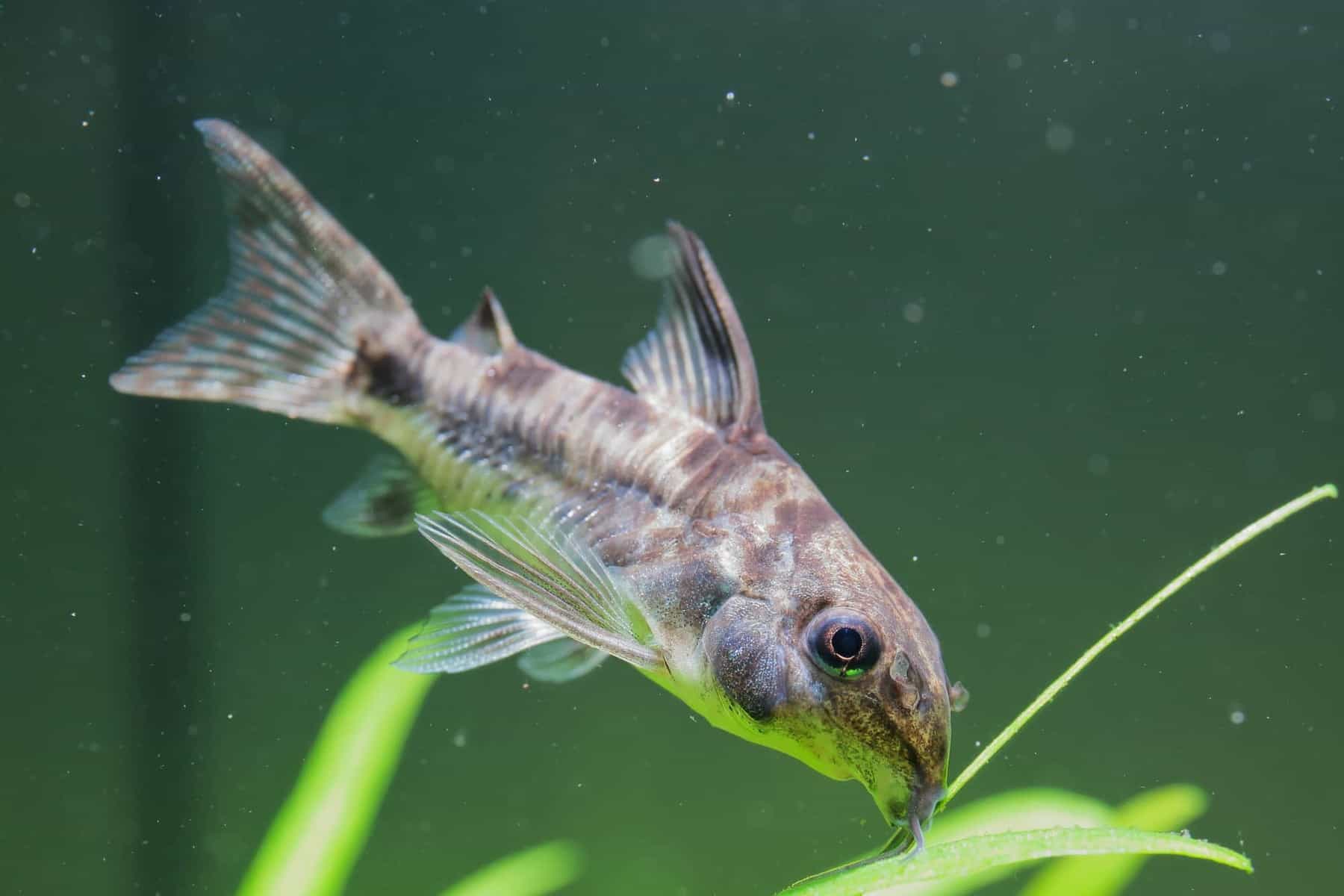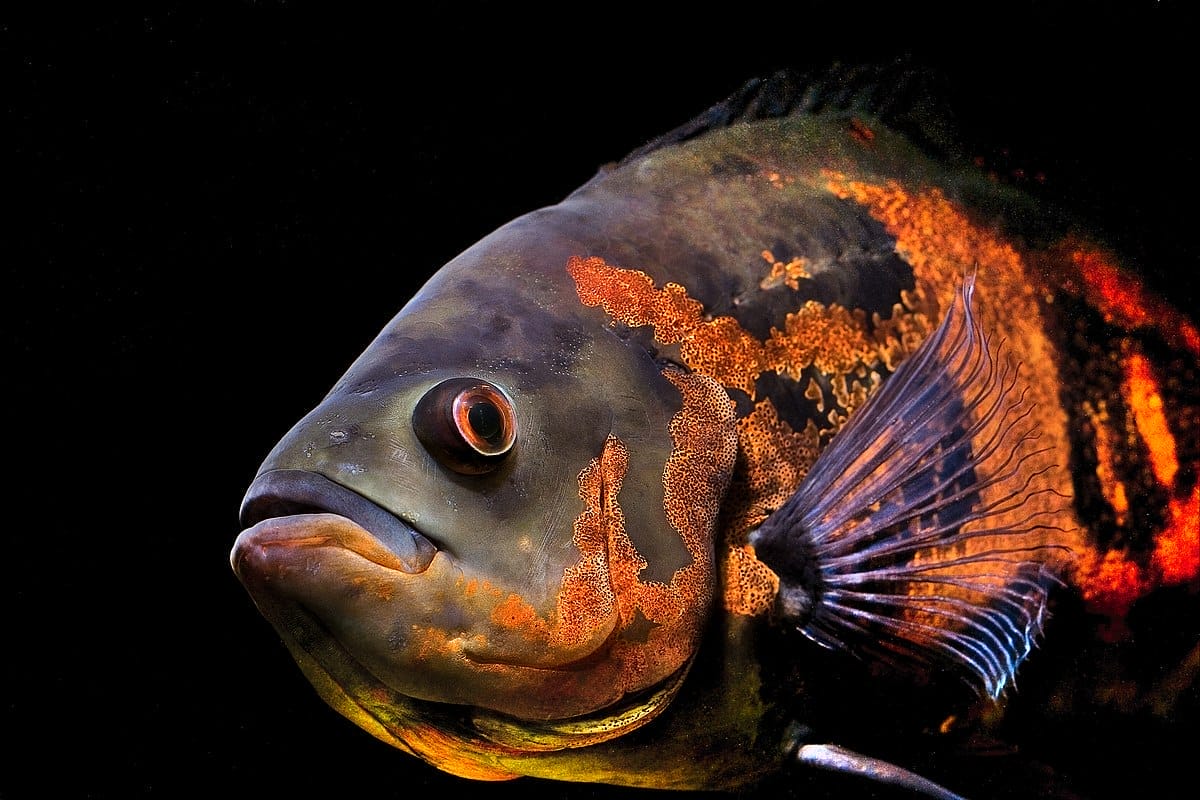
Ultimate Oscar Fish Care Guide

Oscar fish, which are called Astronotus ocellatus, come from the freshwater rivers in South America, especially in South Florida. Because these striking fish are large cichlids, they need bigger tanks since they produce a lot of waste.
With their bright colors and different patterns, like the Tiger and Albino Oscars, they really enhance the look of any aquarium hobbyist’s setup. For their health and happiness, it’s essential to understand their behavior, diet, and what they need in their tanks. Let’s look further into how to take care of Oscar fish and maintain their environment.
Read More : https://realacas.com/the-most-aggressive-freshwater-fish/
Understanding Oscar Fish: An Overview
When thinking about an overview of Oscar fish, it’s important to explore their origins and natural habitat. Starting in South America, these freshwater fish are part of the cichlid family, and they are scientifically called Astronotus ocellatus.
With their striking look, especially the Tiger Oscar with its orange markings, they have become popular in the aquarium hobby. Due to their large adult size and generally aggressive nature, Oscar fish need a minimum tank size. Knowing their unique traits and needs is vital for proper care and maintenance.
The Origin and Natural Habitat of Oscar Fish
Oscar fish, which come from South America, especially from the Amazon River basin, do well in warm freshwater. In places with slow-moving waters and plenty of plants, these large cichlids shine with their bright colors and unique personalities.
In their natural environment, they swim in murky waters filled with a lot of waste. Because of this, regular water changes are important in captivity to keep water quality high and to create a setting similar to their home.
Recognizing Different Types of Oscar Fish
There are different kinds of Oscar fish like Tiger Oscars, Albino Oscars, and Red Oscars. With their orange markings on black backgrounds, Tiger Oscars stand out. In contrast, Albino Oscars do not have any pigmentation and look quite different. As the name implies, Red Oscars show beautiful red coloration.
Because of these differences, each type looks unique, making them popular among aquarium lovers. To properly identify and care for your Oscar fish, it’s important to understand these variations so that they can flourish in their underwater home.
Essential Aquarium Setup for Oscar Fish
When thinking about Oscar fish care, choosing the right tank size and filtration system is really important. For a single adult Oscar, people suggest a minimum tank size of 55 gallons.
Because Oscars are large fish that create a lot of waste, they need adequate filtration to keep the water quality in check. An option to make them look even more stunning is to use a tank with a black background. Regarding filtration, using a canister filter or a powerful HOB filter serves as the best solution to ensure the water stays clean and healthy for your Oscars.
Choosing the Right Tank Size and Filtration System
When you decide on the tank size for your Oscar fish, think about having at least a minimum tank size of 55 gallons for their growth. With efficient filtration systems, you can keep water quality high, especially since Oscars create a lot of waste because they’re messy eaters.
Using a canister filter or a strong HOB (hang-on-back) filter is great for helping to keep the water clean. For making sure that adequate filtration is in place, it’s very important to avoid disease transmission and to help your Oscars live well in a healthy aquatic environment.
Water Conditions and Temperature Requirements
For your Oscar fish to be healthy, keeping the right water conditions is really important. These fish fit well in fresh water because they come from South America, and people call them Astronotus ocellatus. To start, make sure to have a minimum tank size of 55 gallons and maintain a temperature between 74-81°F. With regular checks and water changes, you can keep water quality high. About pH levels, Oscars like them to be slightly acidic to neutral. By paying attention to these details, you can create a habitat similar to their natural environment, which helps them stay healthy and lively.
Diet and Nutrition: Feeding Your Oscar Fish
Oscar fish need a varied diet to stay healthy. You should include meaty foods like brine shrimp and pellets every day. By offering a variety of foods, you help keep your fish in great health.
Keep in mind to avoid overfeeding since it can harm water quality. For a balanced diet, add some vegetables too. Monitoring how much they eat and adjusting when necessary will support their overall well-being.
Ideal Foods and Feeding Schedule for Optimal Health
Oscar fish do best when they eat a varied diet of meaty foods, including brine shrimp, pellets, and even live fish. To prevent overeating and help maintain water quality, feed them small portions twice a day.
With a balanced diet, you can ensure the optimal health of your Oscars by including variety to meet their nutritional needs. Also, you might want to supplement their diet with vegetables like peas or zucchini for extra nutrients. By sticking to a consistent feeding schedule and using high-quality food, you will help keep your Oscar fish healthy and vibrant.
The Importance of Dietary Variety and Supplements
For Oscar fish to really thrive, a varied diet is very important. Along with this, incorporating supplements helps them get essential nutrients. When you provide a mix of meaty foods like brine shrimp, pellets, and live fish, it can mimic their natural environment. By supplementing with vitamins and minerals, you boost their health and colors.
To prevent nutritional deficiencies, avoid overfeeding and offer diverse foods regularly. Overall, dietary variety and supplements play a key role in keeping your Oscar fish healthy.
Behavior and Compatibility: Ensuring a Harmonious Aquarium
Understanding how Oscar fish behave and what they get along with is very important for keeping your aquarium peaceful. Oscars often become territorial, particularly when they breed.
Therefore, it’s important to create hiding spots and provide plenty of space to limit their aggression. When you look for tank mates, make sure to avoid small fish, as Oscars might see them as prey.
Instead, choose larger, calm cichlids or fish that are about the same size to live peacefully with Oscars. By keeping an eye on how they interact and maintaining a balanced tank ecosystem, you can help prevent conflicts in your aquarium.
Understanding Oscar Fish Behavior and Temperament
Oscar fish, with the scientific name Astronotus ocellatus, show smart and engaging behaviors. These South American cichlids like to claim their space, which often leads to fights with other fish in the tank.
Due to their strong curiosity, they can recognize their owners, making them a favorite in the aquarium hobby. With time, Oscars may even move around decorations in their tank to mark their territory. To keep a peaceful aquarium, it’s important to know how aggressive they can be and to choose the right tank mates.
Compatible Tank Mates for Oscar Fish
When you think about getting tank mates for your Oscar fish, remember their aggressive behavior first. Bigger cichlids are good choices, such as Jack Dempsey or other South American cichlids. It’s wise to stay away from small fish, as they could end up as snacks.
For community fish, they won’t work well since Oscars are natural predators. If you have breeding pairs, you might need separate tanks for them. Make sure your tank size is sufficient to avoid territorial fights. By watching their behavior closely, you can prevent any problems. With the right tank mates, you can help make a peaceful environment for your Oscars.
Health and Wellness: Preventing Common Diseases
Oscar fish are usually strong, but they can get sick if their environment isn’t good. Because parasites like ich and velvet are a concern, along with bacterial infections, it’s important to keep everything in check.
Maintaining excellent water quality is key to avoiding these diseases. Regular water changes, good filtration, and watching the temperature are really important parts of this. Quarantining new fish before bringing them in can prevent disease transmission. By being proactive and observant, you can really help your Oscar fish stay healthy and happy.
Identifying Symptoms of Common Oscar Fish Diseases
Oscar fish can get sick from different diseases that affect their health. You should look for signs such as a lack of appetite, odd swimming movements, color changes, white spots (which mean ich), damaged fins, or fast gill movements (a sign they are stressed).
In addition, you need to be careful of bloating, red lines or open wounds, and when they hide often; these may point to serious health problems. By quickly noticing these signs, you can prevent worsening issues and support the health of your Oscar fish.
Preventative Measures and Treatments
To keep your Oscar fish healthy, preventive measures are really important. With regular water changes and good water quality, diseases can be avoided. When problems come up, quick action is necessary. For instance, quarantine new fish to prevent disease transmission. Treat any health issues right away, such as hole-in-the-head disease, using the right medication. By creating a calm environment and getting help from local pet shops or online forums, you can make sure your Oscar fish stays happy and thriving. Similarly, caring for platy fish also requires close attention to water quality and preventive measures. Regular water changes and monitoring for any signs of illness can help keep your platy fish healthy. It’s important to quarantine new fish and treat any health issues promptly to ensure a happy and thriving platy fish environment. Getting advice from experienced fish keepers and doing research on proper platy fish care can also contribute to the overall well-being of your aquarium.





